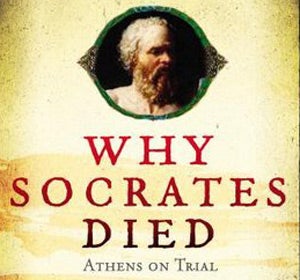Why Socrates Died, By Robin Waterfield
A scalpel to the myths of Athens

Imagine yourself as a conscientious citizen, voter and juror in a brilliant Greek city-state that pioneered a precious but vulnerable system of direct democracy. After a series of ruinous wars with regional rivals, the threat of oligarchy has raised its arrogant head again. Even outright tyranny looked likely before a sort of military junta was ousted a few years ago, and your sacred liberties and laws restored.
Then a strange case comes to court: an elderly maverick of a teacher is accused of undermining the core values of your beloved city. Much of his "philosophy" strikes you as mystical mumbo-jumbo, corrupted by the dark arts of the spin doctor. This gadfly prefers aristocracy to democracy. He even had an affair with a dangerous would-be dictator. This blatant elitist also loves to insult your religious customs, though the city asks for little except discretion and respect.
So this unpatriotic troublemaker mocks your freedom and beliefs, and cosies up to strutting bully-boys in an upper-crust gay clique that you tolerate but can hardly admire. Would you vote for the death penalty? You know it takes the gentlest form imaginable: a slow drift into endless sleep after downing a cup of hemlock.
The execution of Socrates in Athens in 399BC has generated almost as much post-mortem fury as the crucifixion of Jesus of Nazareth. In Socrates' case, the dialogues of his pupil Plato – more novels-of-ideas than trustworthy documents – set the pattern of outrage and elegy. Robin Waterfield's erudite but deeply engaging book takes a historian's scalpel to the myths. Richly detailed, briskly written, it fills in the bloodstained background of Athens around 400BC: the enervating wars with Sparta, the brutal regime of the "Thirty Tyrants", the fatal political charisma of Socrates' ex-lover and pupil, Alcibiades. Even if your vote would still have let the sceptic dodge the poison, you grasp the purpose of the prosecution case. History defeats hindsight.
Join our commenting forum
Join thought-provoking conversations, follow other Independent readers and see their replies
Comments
Bookmark popover
Removed from bookmarks